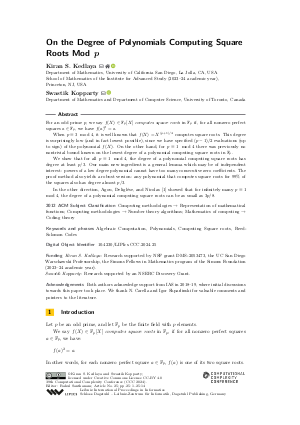On the Degree of Polynomials Computing Square Roots Mod p
Authors
Kiran S. Kedlaya  ,
Swastik Kopparty
,
Swastik Kopparty 
-
Part of:
Volume:
39th Computational Complexity Conference (CCC 2024)
Part of: Series: Leibniz International Proceedings in Informatics (LIPIcs)
Part of: Conference: Computational Complexity Conference (CCC) - License:
 Creative Commons Attribution 4.0 International license
Creative Commons Attribution 4.0 International license
- Publication Date: 2024-07-15
File

PDF
LIPIcs.CCC.2024.25.pdf
- Filesize: 0.7 MB
- 14 pages
Document Identifiers
Subject Classification
ACM Subject Classification
- Computing methodologies → Representation of mathematical functions
- Computing methodologies → Number theory algorithms
- Mathematics of computing → Coding theory
Keywords
- Algebraic Computation
- Polynomials
- Computing Square roots
- Reed-Solomon Codes
Metrics
- Access Statistics
-
Total Accesses (updated on a weekly basis)
0PDF Downloads0Metadata Views
Abstract
For an odd prime p, we say f(X) ∈ F_p[X] computes square roots in F_p if, for all nonzero perfect squares a ∈ F_p, we have f(a)² = a.
When p ≡ 3 mod 4, it is well known that f(X) = X^{(p+1)/4} computes square roots. This degree is surprisingly low (and in fact lowest possible), since we have specified (p-1)/2 evaluations (up to sign) of the polynomial f(X). On the other hand, for p ≡ 1 mod 4 there was previously no nontrivial bound known on the lowest degree of a polynomial computing square roots in F_p.
We show that for all p ≡ 1 mod 4, the degree of a polynomial computing square roots has degree at least p/3. Our main new ingredient is a general lemma which may be of independent interest: powers of a low degree polynomial cannot have too many consecutive zero coefficients. The proof method also yields a robust version: any polynomial that computes square roots for 99% of the squares also has degree almost p/3.
In the other direction, Agou, Deliglése, and Nicolas [Agou et al., 2003] showed that for infinitely many p ≡ 1 mod 4, the degree of a polynomial computing square roots can be as small as 3p/8.
Cite As Get BibTex
Kiran S. Kedlaya and Swastik Kopparty. On the Degree of Polynomials Computing Square Roots Mod p. In 39th Computational Complexity Conference (CCC 2024). Leibniz International Proceedings in Informatics (LIPIcs), Volume 300, pp. 25:1-25:14, Schloss Dagstuhl – Leibniz-Zentrum für Informatik (2024)
https://doi.org/10.4230/LIPIcs.CCC.2024.25
BibTex
@InProceedings{kedlaya_et_al:LIPIcs.CCC.2024.25,
author = {Kedlaya, Kiran S. and Kopparty, Swastik},
title = {{On the Degree of Polynomials Computing Square Roots Mod p}},
booktitle = {39th Computational Complexity Conference (CCC 2024)},
pages = {25:1--25:14},
series = {Leibniz International Proceedings in Informatics (LIPIcs)},
ISBN = {978-3-95977-331-7},
ISSN = {1868-8969},
year = {2024},
volume = {300},
editor = {Santhanam, Rahul},
publisher = {Schloss Dagstuhl -- Leibniz-Zentrum f{\"u}r Informatik},
address = {Dagstuhl, Germany},
URL = {https://drops.dagstuhl.de/entities/document/10.4230/LIPIcs.CCC.2024.25},
URN = {urn:nbn:de:0030-drops-204219},
doi = {10.4230/LIPIcs.CCC.2024.25},
annote = {Keywords: Algebraic Computation, Polynomials, Computing Square roots, Reed-Solomon Codes}
}
Author Details
- Department of Mathematics, University of California San Diego, La Jolla, CA, USA
- School of Mathematics of the Institute for Advanced Study (2023-24 academic year), Princeton, NJ, USA
Funding
- Kedlaya, Kiran S.: Research supported by NSF grant DMS-2053473, the UC San Diego Warschawski Professorship, the Simons Fellows in Mathematics program of the Simons Foundation (2023-24 academic year).
- Kopparty, Swastik: Research supported by an NSERC Discovery Grant.
Acknowledgements
Both authors acknowledge support from IAS in 2018-19, where initial discussions towards this paper took place. We thank N. Carella and Igor Shparlinski for valuable comments and pointers to the literature.
References
-
Simon Joseph Agou, Marc Deléglise, and Jean-Louis Nicolas. Short polynomial representations for square roots modulo p. Designs, Codes and Cryptography, 28(1):33-44, 2003.

-
Sanjeev Arora and Madhu Sudan. Improved low-degree testing and its applications. In Proceedings of the twenty-ninth annual ACM symposium on Theory of computing, pages 485-495, 1997.

-
Eric Bach and Jeffrey Outlaw Shallit. Algorithmic number theory: Efficient algorithms, volume 1. MIT press, 1996.

-
András Biró. On polynomials over prime fields taking only two values on the multiplicative group. Finite Fields and Their Applications, 6(4):302-308, 2000.

- NA Carella. Formulas for the square root modulo p. arXiv preprint, 2011. URL: https://arxiv.org/abs/1101.4605.
-
Seunghwan Chang, Bihtnara Kim, and Hyang-Sook Lee. Polynomial representations for n-th roots in finite fields. Journal of the Korean Mathematical Society, 52(1):209-224, 2015.

-
Don Coppersmith and Igor Shparlinski. On polynomial approximation of the discrete logarithm and the Diffie-Hellman mapping. Journal of Cryptology, 13:339-360, 2000.

-
Venkatesan Guruswami and Atri Rudra. Limits to list decoding reed-solomon codes. In Proceedings of the thirty-seventh annual ACM symposium on Theory of computing, pages 602-609, 2005.

-
Venkatesan Guruswami and Madhu Sudan. Improved decoding of reed-solomon and algebraic-geometric codes. In Proceedings 39th Annual Symposium on Foundations of Computer Science (Cat. No. 98CB36280), pages 28-37. IEEE, 1998.

-
Erich Kaltofen. Effective noether irreducibility forms and applications. In Proceedings of the twenty-third annual ACM symposium on Theory of Computing, pages 54-63, 1991.

-
Richard Clive Mason. Diophantine equations over function fields, volume 96. Cambridge University Press, 1984.

-
Gary Mullen and David White. A polynomial representation for logarithms in gf (q). Acta arithmetica, 3(47):255-261, 1986.

-
Wolfgang M Schmidt. Equations over finite fields: an elementary approach, volume 536. Springer, 2006.

-
Daniel Shanks. Five number-theoretic algorithms. In Proceedings of the Second Manitoba Conference on Numerical Mathematics (Winnipeg), 1973, 1973.

-
Victor Shoup. A computational introduction to number theory and algebra. Cambridge university press, 2009.

-
W Wilson Stothers. Polynomial identities and hauptmoduln. The Quarterly Journal of Mathematics, 32(3):349-370, 1981.

-
Alberto Tonelli. Bemerkung über die Auflösung quadratischer Congruenzen. Nachrichten von der Königl. Gesellschaft der Wissenschaften und der Georg-Augusts-Universität zu Göttingen, 1891:344-346, 1891.

-
Joachim Von Zur Gathen and Jürgen Gerhard. Modern computer algebra. Cambridge university press, 2013.

-
Lloyd R Welch and Elwyn R Berlekamp. Error correction for algebraic block codes. US patent, 4,633,470, 1983.

-
Arne Winterhof. Polynomial interpolation of the discrete logarithm. Designs, Codes and Cryptography, 25(1):63-72, 2002.

